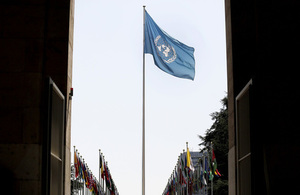UK Statement to the UNGA 73 First Committee on Outer Space
The UK highlighted the opportunities and challenges of a developing commercial space sector and called for the Outer Space Treaty to be adapted in order to reflect our evolving use of space.

UN Flag
The UK aligns itself with the statement delivered by the European Union. I would like to make some remarks in a national capacity.
Today, we face an increasingly congested and contested space environment.
The international legal framework, including the Outer Space Treaty, has served us well for fifty years. We need to continue to develop this framework to reflect our evolving use of space.
Rapid developments in the commercial space sector pose both opportunities and challenges. The expected increase in satellite launches has implications for space debris and the long-term sustainability of outer space activities as well as opportunities for peaceful development and commerce. As we rely more on space in our daily lives, we must protect the space environment for all.
Twenty-one of the Long Term Sustainability guidelines negotiated at COPUOS enjoy consensus. We should now consider how to put them into practical effect.
We are pleased to engage in the Group of Government Experts on Preventing an Arms Race in Outer Space. Although the UK does not rule out the possibility of agreeing a legally binding treaty on outer space in future, serious political, technological and practical challenges must be resolved before negotiations could start. Any new and binding instrument would need to be comprehensive, effective and verifiable.
We would need to arrive at a common understanding of what we mean by a space weapon. In space, any object with manoeuvring capabilities can in theory be used for offensive purposes. Systems in space can also be damaged from earth. Dual-use technologies present an additional challenge.
We are very concerned by the activities of certain states. In February 2017, a Russian Air Force Squadron Commander stated that Russia was developing new missiles with the express intent of destroying satellites. The Russian Ministry of Defence recently announced that its Space Troops have received a mobile laser system known as the Peresvet.
So verification would have to be a key part of any new instrument. Trust between states would require arrangements to monitor and maintain compliance.
Verification may be challenging. There are limits to what can be verified once a vehicle has been launched. Changes to orbits can be measured and evaluated, and attributed to unforeseen events, such as a collision.
As well as accidents there are threats. One example of an on-orbit threat is space-stalkers. The long-term, close proximity of another satellite poses a latent threat and should be discouraged. But routine space operations could bring space objects close to another nation’s satellites, which needs to be allowed.
Therefore, clarifying acceptable and unacceptable behaviour would be important. We would need to consider on-earth technologies that can affect satellites, and the question of attribution of attacks.
These and other important, contemporary elements are missing from the proposed draft treaty on the Prevention of the Placement of Weapons in Outer Space. It does not address fundamental issues of intent and behaviour nor seek to prevent the development of anti-satellite weapons located on Earth. Technical principles need to be translated into concepts of diplomatic utility.
The UK believes that the Group of Government Experts working on the Prevention of an Arms Race in Outer Space should identify elements that could help form a set of non-legally binding rules, principles and guidelines and TCBMs that support the conduct of human space activity in a safe, secure and sustainable way and in compliance with international law.